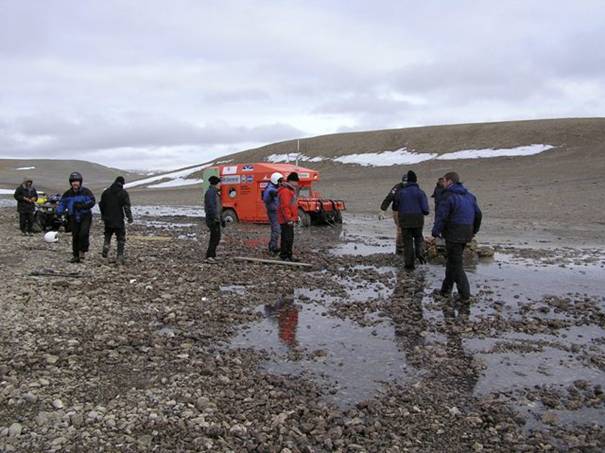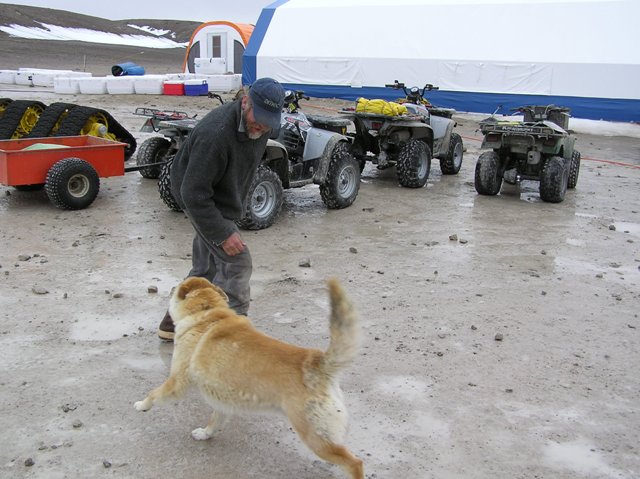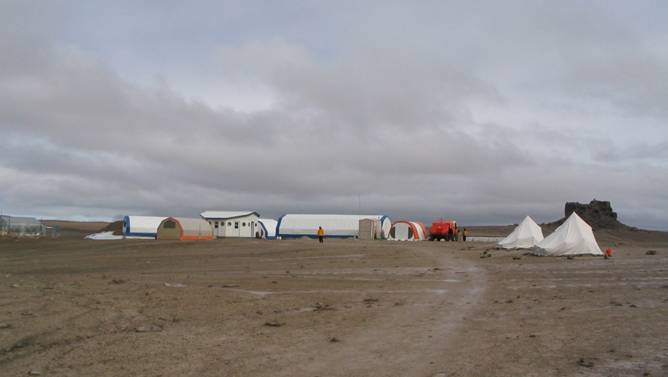HMP e-Logbook
As the field season progressed, the MIT team recorded and posted daily a record of their activities, along with a few selected photos.
The field site's logbook has been duplicated here.
July: 8 10 11 12 14 15 16 17 18 19 20 21 22 23 24 25 26 27 28 29 30 31 August: 1 2 3 4-6
July 19, 2005
Written by Matthew Silver
Two very good things, and one not so good happened on Devon Island today: the weather got better, and we received an internet connection. On the other hand, Pascal and the Georgia Tech drill team took the Humvee out for a spin and got it lodged deeply in thick mud. The mud here is almost like quicksand. It is firm for a bit, and becomes progressively less viscous as pressure is applied to it. About 2 feet down, however, it turns to permafrost. It is now 11:50pm, and the team has just made it back from the near the crater, where they worked to remove the Humvee for about 7 hours. One ATV was run to the ground and left in the area, another broke down but was fixed. Pascal or Oz will likely return to fix it tomorrow. The Georgia Tech team has a project to test a Mars Drill, and is PI'd by Brian Glass at NASA Ames. Below is a picture I received from Jean Marc, who visited the team while they were working to fix the vehicle:

While our RFID gates gathered data, Mike and I switched gears and begun to organize the formal RFID experiments. We decided to test the efficacy of an RFID gate with one, two, three, and four antennas each, and compare this to bar code readers. We will ask several people to log about 30 items in these four ways, to get a basic idea of error rates and total time. To set this experiment up I collected items, and installed and prepared the bar-code readers, and Mike coded a new database entry for the experiment. It is also interesting that people are beginning to come to us more and more to find things. This mostly occurs with general camp items since the teams have their stuff relatively organized. It is becoming apparent that tracking at a fine level is much more valuable than at a coarse level—i.e. tent to tent. People often know roughly where things are, but forget what case it's in. Mike and I discussed the possibility of "smart cabinets" which could be designed to be RF opaque, with each housing a separate antenna. Once the internet came on the rest of the day was spent responding to emails, updating the website, and sorting through these logs.
In other news, I forgot to mention that the plane yesterday brought the one and only Kimmick, the camp dog whose primary role is to sniff out Polar Bears. Kimmick means dog in Inukituk, the language the Inuits. Below is a picture of John Schutt and Kimmick, as well as a picture of camp in the slightly better weather.



